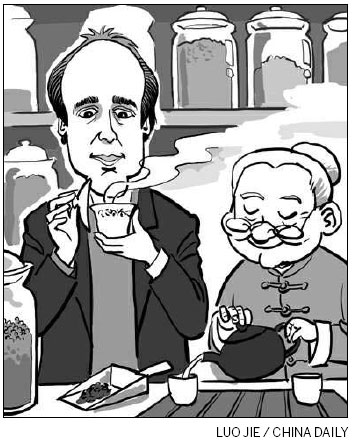
Coming, as I do, from the UK, I am more than familiar with drinking tea and the delightful pause it offers from the demands of a hectic day. So, even before I came to China, I was excited to come to a country that also had a rich and long-established tea culture.
However, nothing had quite prepared me for the myriad, subtle intricacies of the art of not just tea making, but everything that went into the process of producing the tea itself. In a world that seems to be addicted to the early morning coffee rush, as well as the late morning caffeine pick-me-up, it's refreshing to pause and consider tea's subtle, gentle delights.
The world of Chinese tea is also endlessly surprising. After spending six years in Guangzhou and often visiting its sprawling tea market, which has more than 600 teashops, I thought I was fairly well versed in the subject-and varieties-of Chinese tea. However, surprises come often in China, and they can be pleasant indeed.
On a recent Saturday, I'd planned to go to an organic farmers' market. However, after arriving at the venue, I was informed that the event was postponed. I was disappointed, but the surrounding area looked interesting, so I decided to explore and see if I could salvage something from my morning.
After walking to the end of the picturesque, narrow hutong, I came out onto a busy street. I am always on the look out for interesting-looking teashops, and one in particular caught my eye. An elderly lady with the kind of face which reminded me of a doting grandmother welcomed me into her shop, and invited me to take a look at the different kinds of tea on offer.
The shop was quite small, but packed with fascinating teas. Fortunately, my Chinese is good enough to engage in basic conversation, and I listened as she told me that her teas were "High Mountain Teas" from Taiwan. She told me that the different teas were grown at different altitudes: The higher the altitude, the more expensive the tea. Also, because of the high altitude and clean air, no pesticides were used in the growing process and the tea offered many unique health benefits.
All of this was new to me. I had never heard of Taiwan High Mountain tea, and I was curious to try some. The kindly shop owner happily obliged, and invited me to sit down with her at her tea tray and sample some of her teas. This is one of the very best parts of buying tea in China - and tea culture generally. Tea cannot be rushed. It must be brewed and sampled in a calm and relaxed manner. The tea, as well as the process of tea making, offer a wonderful antidote to the hustle and bustle of life in a big city.
After listening to her knowledgeable and patient explanation of how to brew the tea, what temperature the water should be and how it should be stored, I was so taken by the delicate and subtle flavor that I had to buy some. To my delight, she also gave me a sample of the shop's most expensive tea, grown at the highest altitude.
I have no idea how long I spent in her shop, but time had ceased to matter. Tea culture has its own rules and rhythms and time merely takes you from one delicious tea to the next. As I left her shop with my precious parcels, I reflected on how China was full of wonderful surprises, and how some of my most precious experiences had been born out of initial disappointment. I was happy, too, that I would now be able to enact my own private tea ceremony whenever I wished.
Whatever trials Beijing's workaday week may hold in store for me, I know that I can always find a moment of serenity thanks to the wonderful culture of tea.
